The Truth About Hybrid Publishing in 2024
Authors have always thought that to get their books to the light, they either have to go for traditional publishing or self-publishing. But thankfully, there is a third alternative that combines the best of both worlds, and that is hybrid publishing. And even though the term hybrid publishing might seem complicated for some, it is actually pretty simple.
If you’d like to skip the hassle of finding an agent who pitches your work to a traditional publisher, or avoid the tiring process of finding the perfect self-publishing platform, then keep reading this article to discover what hybrid publishing is all about.

What Is Hybrid Publishing?
Hybrid publishing refers to a relatively new publishing model where an author pays a reputable publishing company to publish his book. This company then oversees the publishing process and ensures professional quality and services. Hybrid publishers usually work with highly trained teams that edit, design, and market the books.
This takes the load off the authors’ shoulders and helps them focus on the writing process. And in exchange for the publishing fees they pay, they get much higher royalties than those of traditional publishing.

What Is the Difference Between Self-Publishing and Hybrid Publishing?
As described on Jane Friedman’s blog, the difference between self-publishing and hybrid book publishing is that the latter is more like dealing with a contractor. The author gets to pay the hybrid publishing company for the different publishing costs, like editing, designing, and printing. The company, on the other hand, oversees these processes to ensure professional quality.
In self-publishing, however, the author gets to both pay for the publishing costs and oversees every single detail–including choosing the designers, editors, and publishing platforms. He also gets to negotiate the prices and strive for great quality.
Read: Battle of the Titans: Self-Publishing vs Traditional Publishing
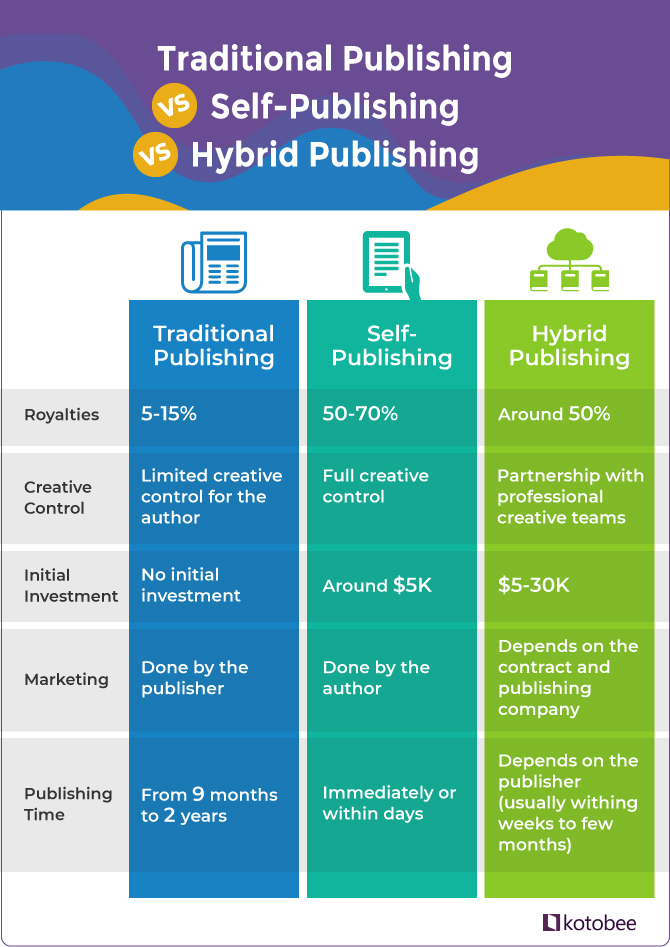
How Does Hybrid Publishing Work?
To get a book published through a hybrid publishing company, all the author needs to do is submit their manuscript (or some sample pages) to the publisher to evaluate. If the publisher accepts the work, they then offer the author serval packages with different services (e.g. editing, marketing, etc.); some publishers might also offer a custom-designed plan based on the author’s needs.
It’s advised for authors to carefully go over the contract before signing and to discuss any possible additional costs with the publisher–such as costs of advanced reader copies, shipping, storage, etc.
Is Hybrid Publishing the Same as Vanity Publishing?
Vanity press has the same business model as hybrid publishers, where authors have to pay to get their books published. The difference is that vanity publishers only care about making money off the authors, so they accept any book submitted to them. By contrast, hybrid publishers are selective and genuinely care about the authors’ success.
Vanity press always has hidden costs and low-quality services. They often don’t have any distribution or marketing service, and they scam writers to get huge amounts of money out of them. They do all this with the promise of getting the book “published,” but the quality is usually very low. This makes books published through vanity press considered by book reviewers as “less prestigious” than those of traditional and hybrid publishers.
Recognizing vanity press could be tricky, especially since most vanity publishers insist on calling themselves “hybrid publishers.” Luckily, there are some standards that differentiate the two (we’ll discuss them in the following part). This makes it for authors to tell which is which.
What Makes a Good Hybrid Publishing Company?
In an attempt to set clear standards for hybrid press, the Independent Book Publishers Association (IBPA) released a hybrid publishers’ criteria. Here are the 9 expectations the IBPA set for hybrid publishers to meet:
- Just like traditional publishers, hybrid publishers must have a clear vision and mission for their publishing programs.
- Hybrid publishers shouldn’t accept all submissions; only the ones that meet their vision and mission.
- They also have to publish using their own imprints and ISBNs.
- Since they’re publishing houses, they carry full responsibility for the work they publish. The titles they publish are required to meet the industry standards.
- They have to ensure the quality of the final published book. This means that the editorial, design, and production processes should be just like that of traditional publishers.
- Hybrid publishers usually publish in digital and print formats. They can also pursue other publishing rights (such as audiobooks, translated books, etc.) so they can reach a wider audience.
- Being the publishers makes them obliged to distribute the books they published. In addition to the usual online platforms, hybrid publishers could also have sales representatives who actively market and sell the books to retailers. These publishers also have to develop a marketing strategy with the authors and help them execute it.
- A reputable hybrid publisher should have a record of books it published and sold in respectable quantities.
- Authors’ royalties with hybrid publishers should be stated and communicated clearly and transparently. It should also be higher than that of traditional publishing.

What Are the Types of Hybrid Publishing?
There are 3 different ways through which authors can approach hybrid publishing. These are:
Partnership
In this hybrid publishing model, the author approaches either a traditional publishing company or a company that’s dedicated to hybrid publishing alone. He then pays the publishing costs upfront and lets the publisher takes over the publishing process.
Agent-Assisted
Sometimes when an author, especially a new one, sends their submission to a literary agent, this agent might find that even though this work has potential, a traditional publisher might not take the financial risk of publishing it. Instead, the agent will suggest that this work is better suited for hybrid publishing, and will proceed to oversee the publishing process himself.
Crowdfunding
Since the author needs to pay the publishing fees upfront, some hybrid publishers offer their own crowdfunding platform to help the authors collect these fees. This is usually done for authors with existing demand for their books.
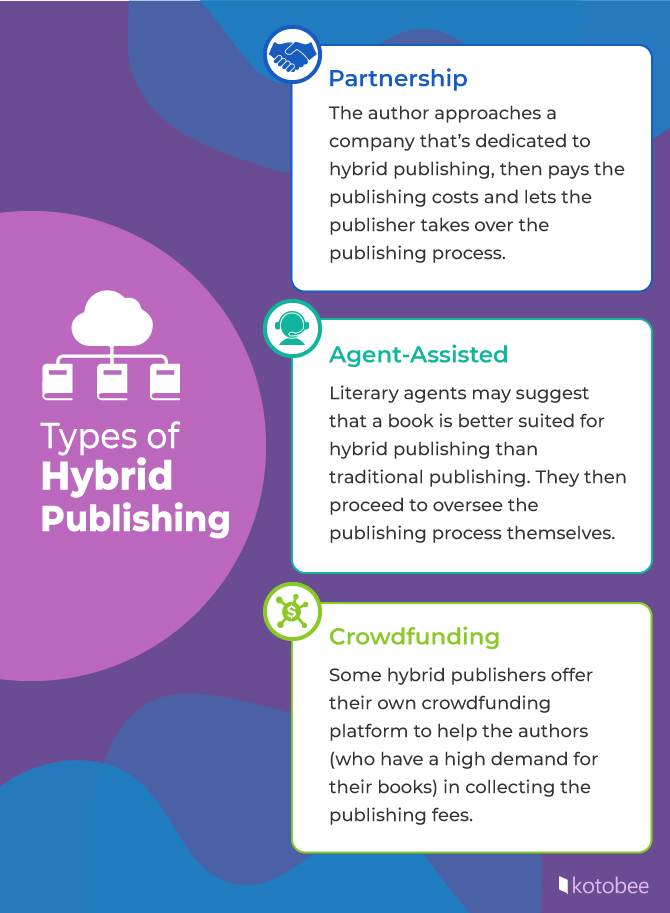
What Are the Pros and Cons of Hybrid Publishing?
Hybrid publishing does seem like the bridge between self-publishing and traditional publishing, combining the best of the two worlds. But before you decide whether to go for it or not, let’s take a look at some of the hybrid publishing pros and cons.
Hybrid publishing benefits include:
- Taking away the hassle of overseeing the publishing process from the authors.
- Giving authors more control over the publishing process.
- Minimizing the overall costs authors pay to get published, compared to the costs of self-publishing.
- Paying higher royalties than traditional publishing.
- Providing the authors with a professionally produced and published book.
Drawbacks of hybrid publishing include:
- Paying and investing a large sum of money to publish the book.
- Avoiding the scam of vanity press and finding the right hybrid publisher could be tricky.
- Not all hybrid publishers do the heavy work of marketing the books they publish, leaving this task to the authors.
- Some book reviewers are still skeptical about the hybrid publishing module, considering it the same as self-publishing.
How Much Does Hybrid Publishing Cost?
Just like self-publishing, hybrid publishing requires investing money. This investment covers everything, from the fees of hiring editors, proofreaders, and designers, to the costs of publishing and printing. Also having a middle man (the hybrid publisher) to ensure a premium quality raises this cost.
The average cost of hybrid publishing can be as low as $2.5K or as high as $30K. This cost varies depending on the publishing house and the services they provide. It also covers both the fees of the publishing process as well as the publishers’ commission.
What Is the Royalty of Hybrid Publishing?
One of the essential things to know about hybrid publishing before going into a deal with the publisher is the royalty authors get from it. This royalty should be proportionate to the author’s initial investment.
The good thing about the royalties of this kind of publishing is that they are much greater than that of traditional publishing. And even though these royalties vary depending on the publisher and the contract, it is usually about 50% of the net profits on both digital and print books.
What Are Some of the Best Hybrid Publishing Companies?
Selecting a hybrid publishing company that meets all your publishing needs might not be an easy task. But one thing you need to be aware of – in order to avoid vanity publishers– is that good hybrid publishers don’t accept all books; instead, they vet the submissions before they decide to take them or not.
Here are some of the best hybrid publishers in 2024:
She Writes Press
Dedicated mainly to female authors, this is an award-winning hybrid publishing company that accepts submissions in many fiction and non-fiction genres, including cookbooks, poetry, and self-help. Their packages include editing, designing, print-on-demand, and distribution.

Amplify
If you are looking for the highest royalties in the field of hybrid publishing, then you might want to consider Amplify, which offers an 85% royalty rate. There are also marketing and distribution services included in their packages.
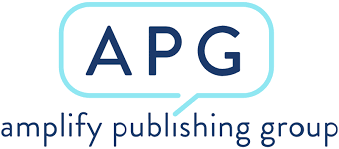
Advantage Forbes Books
Even though Forbes publishing services might be more pricy than other hybrid publishers, it is surely one of the most reputable hybrid publishers. According to Entrepreneur, publishing with Forbes can cost around $25K. This includes ghostwriting services as well as online retail distribution.

Inkshares
This is a great example of a hybrid publishing company that offers a crowdfunding campaign to help authors raise the required money for publishing their books. In return, Inkshares gets the exclusive rights to publish and sell these books, in both digital and print forms. Another great thing about Inkshares is that it registers the copyright on the author’s behalf and places a copyright notice in his name on all copies of the work.
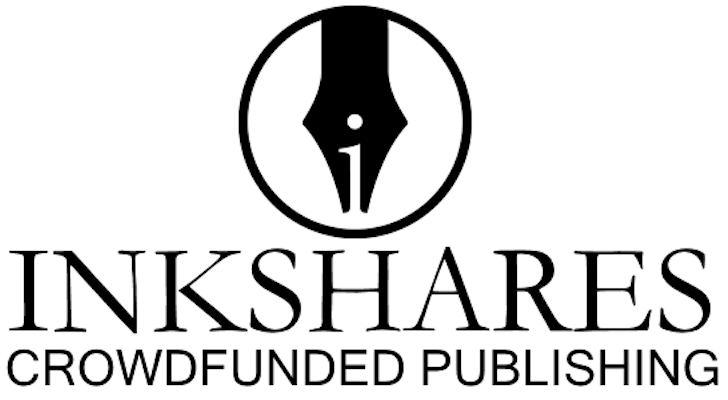
Greenleaf
Being in the publishing industry for 25 years gives Greenleaf an advantage over other hybrid publishers. This company has succeeded in publishing thousands of books, with more than 45 Wall Street Journal and New York Times bestsellers. Besides the usual editing, designing, and printing services, Greenleaf also offers distribution, sales, and marketing.
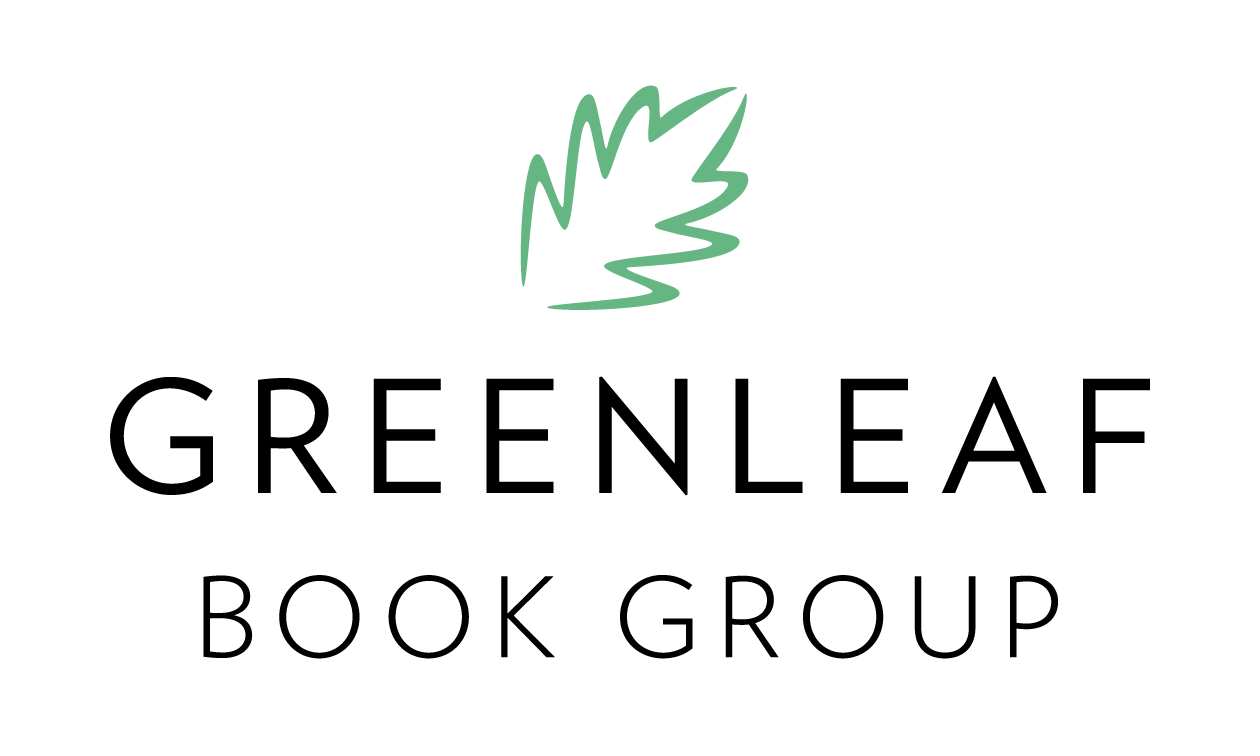
Final Thoughts
It’s well-known that the process of writing and publishing isn’t a piece of cake. However, getting the professional help you need to get your book to the public can certainly make the job easier. Selecting the right hybrid publisher will not only facilitate the publishing process for you, but it can also position your book among some of the best sellers out there.
.
Read More
Self-Publishing on Amazon: Pros and Cons












John Weston
November 7, 2022Great information. I have finished my first novel now comes the hard bit but the information I have just read eases the concerns I have re the publishing side of writing. Thank you. Regards John Weston.
Kotobee
December 29, 2022We’re glad to help, and best of luck with publishing your novel 🙂
Jenn Paisley
November 17, 2022Thank you for the thorough explanation of “hybrid publishing.” I’ve been out of the publishing loop for a number of years and this helped me assess the benefits and detriments of this option.
Kotobee
April 4, 2023Glad the article helped you understand hybrid publishing. It can be a good choice if you want more control and are willing to invest upfront. But make sure to research hybrid publishing companies to ensure they’re reputable and will deliver what they promise. Good luck navigating the publishing world! 🙂
Collette Wolfe
December 2, 2022Found this very helpful as I have just finished writing a second book the first one is published, by hatchet publishers, and I was looking into different options for this book thank you
Kotobee
April 4, 2023We’re glad you found the article helpful! Hybrid publishing could be a good choice if you want more control over the publishing process and are willing to invest some money upfront. Best of luck with your second book!
Gretchen Huntley
February 11, 2023I did not see TellWell Publishers here and wonder if you have any thoughts on them?
Kotobee
April 4, 2023We don’t have any specific thoughts on TellWell Publishers. However, when considering a hybrid publishing company, it’s always a good idea to thoroughly research them to make sure they are reputable and can deliver on the services they promise. You can check their website, read reviews from other authors, and even reach out to them directly with any questions you may have. Additionally, it can be helpful to compare multiple companies to determine which one best meets your needs and goals as an author.
Eryl
March 10, 2023Thank you so much for this. I have been offered a publishing contract from Novum but I’m unsure if they are a hybrid publisher or a vanity publisher?
Kotobee
April 4, 2023It’s always important to be careful and fully understand the terms of a publishing contract before signing it. Novum appears to be a German-based publishing company that offers a variety of publishing services, including both traditional and self-publishing options. However, it’s unclear from their website whether they would be considered a hybrid or vanity publisher.
We’d recommend that you carefully review the terms of the contract offered by Novum and reach out to them with any questions or concerns you may have. You can also look for reviews or testimonials from other authors who have worked with the company to get a better sense of their reputation and the level of support they provide.
Andrea Clark
March 24, 2023I have been offered a hybrid book contract by Austin Macauley. Any thoughts on them for children’s books? The two main hybrid publishers that I have found that also publish children’s stories are Greenleaf and Mascot publishing. I have seen Greenleaf recommended by 2 sites now (including this one). Thank you so much.
Kotobee
April 4, 2023Congratulations on being offered a book contract!
As for Austin Macauley’s suitability for children’s books, we don’t have any specific thoughts on them. However, it’s always a good idea to do your research and look for reviews or testimonials from other authors who have worked with the company, especially in your specific genre.
Regarding the two other hybrid publishers you mentioned, Greenleaf and Mascot Publishing, Greenleaf has a good reputation and has been recommended by multiple sources for publishing children’s books. Mascot Publishing is a newer company, so there may be less information available about their reputation and services. We recommend that you thoroughly research any company you’re considering working with to ensure they’re reputable and will provide the services they promise.
Best of luck with your publishing journey! 🙂
Shirley
May 2, 2023This is a great article. It helped lift the fog on self publishing and hybrid publishing. The thing that is still fuzzy for me is how the hybrid company, Inkshares works. I get parts of it but not the entire picture.
Thanks for the information.
Kotobee
May 30, 2023We’re glad to hear that you found the article helpful!
Understanding the workings of hybrid publishing companies like Inkshares can sometimes be a bit confusing. Inkshares is a platform that combines elements of traditional publishing and crowdfunding to help authors bring their books to life.
Here’s a brief overview of how Inkshares typically operates:
1. Authors submit their book proposals to Inkshares for consideration.
2. Inkshares evaluates the proposals based on various criteria, such as market potential, quality of writing, and audience appeal.
3. If a proposal is accepted, Inkshares provides editorial and publishing support, including editing, design, and distribution.
4. The crowdfunding aspect comes into play as authors are encouraged to promote their book and gather pre-orders from readers.
5. Once a book reaches a specified pre-order threshold, Inkshares moves forward with full publishing, including printing and distribution.
6. Inkshares handles the distribution of the book to retailers and manages sales and royalties.
The main benefit of Inkshares’ hybrid approach is that it combines the advantages of traditional publishing (editorial support, distribution) with the crowdfunding model (audience engagement, pre-orders) to help authors get their books published.
Linda
June 2, 2023Do you know anything about True Potential Media? Considering using them for a Christian children’s book.
Kotobee
June 8, 2023Hi Linda, while I don’t have personal experience with True Potential Media, I can offer some suggestions on how to evaluate them for your Christian children’s book. Firstly, research their reputation by looking for reviews or testimonials from other authors who have worked with them. Additionally, check if they have published similar books in the past, especially within the Christian genre. It’s important to consider their expertise in reaching the target audience effectively. Lastly, reach out to them directly and ask specific questions about their approach, timelines, and any other concerns you may have. This will help you gauge their professionalism and and whether or not they align with your vision. Best of luck with your publishing journey!
Heidi McKenzie
June 27, 2023Thank you for an excellent article. I’m wondering if you have any thoughts regarding Atmosphere Press?
Kotobee
September 10, 2023Hello Heidi,
Thank you for your kind words, and we’re glad you found the article helpful!
Regarding Atmosphere Press, they are a hybrid publishing company that offers a unique publishing model. If you have specific questions about Atmosphere Press or would like more information about their services, I recommend visiting their website or reaching out to them directly.
It’s always a good idea to research and compare different publishing options to find the one that best suits your needs and goals.
Keri Wyatt Kent
June 28, 2023Super helpful content. However, as a multi-published author (both traditional and self-published), I must point out that no publisher does all the marketing for you. Authors always help to market their books. And in fact, to get a deal with a traditional publisher, you need to show that you have an audience already: an impressive email list, a strongly engaged social media audience, etc. How does an author get that audience? By engaging in marketing before they even approach a publisher. I help authors self-publish (not really hybrid, but assisted self-publishing) and many would-be authors assume going the traditional route means they don’t have to do any marketing, which is not the case.
Kotobee
September 10, 2023Thank you for your valuable insights, Keri!
You’ve made an excellent point. Marketing collaboration between authors and publishers is indeed crucial in both traditional and hybrid publishing. Building an author platform and engaging in marketing efforts, including growing an email list and a strong social media presence, is a vital step for success in the publishing world.
We appreciate your contribution to the discussion and look forward to more insights from you. 🙂
Marilyn
July 15, 2023I have several children’s stories which I believe are ready for someone to review and turn into books. I love the idea of hybrid but I’m concerned about the upfront costs and how much they will actually be. Are children’s picture book less expensive (re: upfront money) due to fewer pages? Can we submit our own artwork for the story? Is there a ballpark $$ figure for this type of book?
Thanks in advance for any insight.
Kotobee
September 10, 2023The upfront costs for publishing a children’s picture book can vary widely depending on several factors, including the length of the book, the complexity of the illustrations, and the publishing services you choose. Children’s picture books are often shorter in length, which can reduce printing costs compared to longer books, but the cost of illustrations can be a significant factor.
Many hybrid publishers allow authors to submit their own artwork for the story, which can help reduce costs if you’re an illustrator or have access to one. However, if you need professional illustrations, this can be a substantial upfront expense.
As for a ballpark figure, it’s challenging to provide an exact amount because it varies so much. It’s advisable to research different hybrid publishers and request quotes based on your specific project details. Make sure to inquire about their pricing structure, including any upfront fees and royalties, to get a clear picture of the financial commitment involved.
Allyssa
October 15, 2023I was wondering what you know about Blue Balloon Books an imprint of Ballst books.
Kotobee
November 6, 2023Hi Allyssa,
Thank you for your inquiry about Blue Balloon Books. Unfortunately, we don’t have specific information about this particular imprint. However, when considering any hybrid publisher, it’s crucial to research their reputation, track record, and client testimonials. Reach out to authors who have worked with them, if possible, and consult industry resources such as the Alliance of Independent Authors (ALLi) for insights. Additionally, carefully review the contract terms, ensuring transparency and fair treatment.
Wishing you all the best in your publishing endeavors. 🙂
RAM NARENDAR Narendar
December 12, 2023What about Olympia publishers. ? I have been offered a contract for hybrid publishing from this company for my non fiction book.
Kotobee
December 27, 2023Hi Ram!
We don’t have specific information about Olympia Publishers. However, before proceeding with any publishing contract, it’s advisable to carefully review the terms and conditions. Ensure you understand the distribution model, rights involved, and any financial commitments. Additionally, we advise you to look for reviews and testimonials from other authors who have worked with Olympia Publishers to gauge their experiences.
AUGUSTUS H GREEN, JR
January 7, 2024I have heard both good and bad comments about Page Publishing. Does anyone have any thoughts? Also, I have accomplished some research on both Amplify and Page. My research tells me Amplify is likely better for my type of book, the first edition of which is currently on Amazon, but I wasn’t entirely satisfied with the marketing aspects. Consequently, I am going to unpublish it and try a second edition in which material has been added to clarify the contextual flow and correct a few, mostly insignificant typos that no one seems to have picked up on. On Amazon, the book has never received a review less than 4 stars which has definitely pleased me although less than a hundred books have been sold. Page has accepted my second edition but none of their packages was appropriate in my case because marketing is not provided as a separate package. My book was entitled “From evil’s dark abyss into glory’s light.” The second edition is changed to “Angela’s redemption.” What hybrid publishers would be best to consider for a fiction spiritual suspense book?
Kotobee
April 21, 2024Hi Augustus!
It sounds like you’ve put a lot of thought into your book, and we admire your dedication to improving it. Considering your specific requirements for a fiction spiritual suspense book, here are some hybrid publishers you might want to explore:
1. Greenleaf Book Group
2. Scribe Media
3. Lifetree Media
4. Sounds True
5. Hay House
Remember to thoroughly research each publisher, review their submission guidelines, and consider factors like marketing support, distribution, and creative control.
Best of luck with your second edition! 🙂
Stella Fosse
March 14, 2024Thanks, great article. One follow-up question: How does a contract with a hybrid publisher differ from a contract with a traditional publisher?
Kotobee
April 21, 2024Hi Stella!
Thank you for your kind words. 🙂
Here are the key differences between traditional and hybrid publishing contracts:
1. Ownership:
– Hybrid Publisher: You retain ownership of your book.
– Traditional Publisher: You give up rights to your book; they own it.
2. Costs:
-Hybrid: Authors often share production costs and don’t get any advance.
– Traditional: The publisher covers all costs and pays an advance.
3. Royalties:
-Hybrid: Usually offers higher royalty rates.
-Traditional: Lower royalties, but publisher handles expenses.
Jerffrey Muller
June 4, 2024I have had a book published by Shawline Publishing. Bad mistake!
Shawline’s website offers much, including global distribution through 40,000 resellers, a clear long term focused marketing campaign, and ongoing support from a professional publisher.
Shawline did produce a good book, but the marketing campaign was a half-hour shared zoom meeting with other authors, in which we were told to go out and sell our books at market stalls, hairdressing salons, retirement homes, etc. That was it. Requests for further help or guidance are met with repetitive explanations that Shawline can only offer the book, they can’t make it sell.
If left to Shawline, I doubt I’d have sold more than a hundred books in the first six months.
I found that I COULD sell through book signings, and sold many more, only to find that my 70% of profits equate to just over 25 cents per book, (from $32.99 retail), because Shawline prints only to demand, which is expensive, and apply a totally fictitious overhead cost per book.
Racer
June 5, 2024I have a completely nutty question….
I’m a self-published and published children’s book author. My publishing house just closed its doors this week (I had 3 books in the works – one coming out in 2 months!). Heartbreaking doesn’t describe the situation. So what to do now?
I have no desire to self-publish again, which leaves me the option of going thru the submission process with traditional publishing houses. Not thrilled about going thru that again either. Sooo. I am considering staring my own independent publishing house – a type of hybrid.
Instead of charging people thousands of dollars up front as hybrids do – can I offer the author a type of ala carte service? I was a freelance writer for over 10 years and have worked with a lot of really great folks. I’ll have several freelance editors, illustrators, graphic artists and marketers that I have all vetted, the author can select from. THEY pay the freelancers for their service – I’d get no $$$$. I’d do the publishing part.
There are soo many wonderfully talented authors who just don’t get the chance to get published. Perhaps I can do my part to make that happen for some of them??
Is this a stupid idea???? Any thoughts/suggestions?
Kotobee
June 10, 2024Hi Racer,
Thank you for sharing your story. I’m sorry to hear about your publishing house closing – that must be incredibly tough, especially with books so close to publication.
Your idea of starting an independent publishing house with an à la carte service model sounds innovative and supportive. Many authors face significant financial barriers with traditional hybrid models, so offering a more flexible, service-oriented approach could be very appealing.